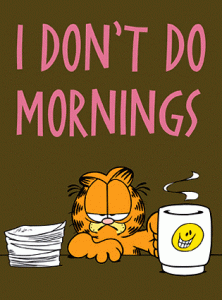Are You a Morning or an Evening Person? Part 2 of 2

In my last post, I left you with the following question: “If you made a long to-do list, would you tackle this list in the morning or later in the afternoon or evening?”
Your answer may give you a little insight as to whether you are a morning or an evening person. Since I read Randler’s article, I have taken it upon myself to ask a few of my friends and family if they preferred doing tasks in the morning versus the evening. Going into my informal and non-scientific survey, I was expecting a few to answer that they were neither, and that they could do tasks equally well in the morning and evening.
Surprisingly, every person I asked had a preference one way or another. The people I spoke with were aware of what time of day they were most productive. (Perhaps they were not threatened by my questions and knew that there would be no repercussions for answering honestly.)
My guess is that most people, by young adulthood, know whether they are a morning or an evening person. Yet, rarely do I hear of people vocalize their preference when talking about careers.
Granted, the majority of professional “office jobs” adhere to business hours, which revolve around a 8:30-5 or 6ish workday. That said, I am reminded of my exposure to careers that do not follow this mold. Example careers are: chefs, employees at some start-up companies, retail, and doctors. As I began to think about all of the jobs that do not revolve around an 8:30-5 workday, I am reminded that not everyone works in this rigid environment.
As we learn more about employer work habits, styles and preferences, managers are adapting management styles to increase worker satisfaction (and productivity and loyalty). As managers, do we take this into consideration when evaluating employees and creating a workplace environment? Certainly not all jobs will allow flexibility, but I am guessing that there are more jobs that can afford flexibility of work hours.
As employees, how much is this topic part of our consciousness? And if I am an evening person working in a morning person’s world, what implications does this have?
Randler suggests that individuals are able to slowly adapt their circadian clocks to a schedule. And there seems to be some evidence that people’s inner clocks change as they age. While this question may not be at the top of your list when considering a career or new job, it might be one of many you may ask yourself.
While I find this study somewhat controversial, yet strangely intriguing, I don’t want my message to get lost in the argument. Along with many other questions, I believe the question of whether you are a morning or evening person may have value.
As Andy writes in his article, Critical Thinking – A Critical Component to Career Self-Assessment, I believe every student and seasoned career professional will benefit from a thoughtful process of self evaluation. And while I believe it is paramount for college students to engage this process to make more informed career choices, I believe that this is also a process that take place over the span of every person’s career.
Most career counselors will tell you that workers change careers 3-5 times over their lifetimes (not 3-5 jobs, but careers). We know it is important to self-assess and self-evaluate before making a career decision. But we also know it is important to self-asses and self-evaluate before and during a career transition.
There are many ways in which you can begin (or continue) to self-reflect. It all starts with self-awareness, which includes questions such as the following:
- What is important to me?
- What can I live without?
- What type of work environment do I want to work in?
- What do I want to do for a career?
These are all questions that start with knowing your interests, values, ambitions and skills.
The Myers-Briggs Type Indicator assessment is one of the more popular personality type indicators that can help identify key personality themes that may increase your understanding of how you work and how you work with others.
The Strong Interest Inventory is an assessment that augments the participant’s awareness of interests, as it relates to jobs and careers. It is one of the more ubiquitous assessments, and is offered by many colleges and universities.
Andy’s article asks several questions which may be a good starting place for some folks.